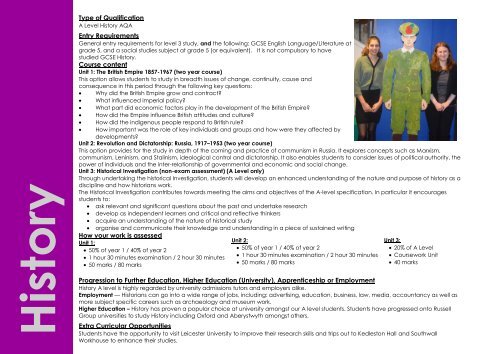Sixth Form Options Booklet 2019-21
You also want an ePaper? Increase the reach of your titles
YUMPU automatically turns print PDFs into web optimized ePapers that Google loves.
History<br />
Type of Qualification<br />
A Level History AQA<br />
Entry Requirements<br />
General entry requirements for level 3 study, and the following: GCSE English Language/Literature at<br />
grade 5, and a social studies subject at grade 5 (or equivalent). It is not compulsory to have<br />
studied GCSE History.<br />
Course content<br />
Unit 1: The British Empire 1857-1967 (two year course)<br />
This option allows students to study in breadth issues of change, continuity, cause and<br />
consequence in this period through the following key questions:<br />
Why did the British Empire grow and contract?<br />
What influenced imperial policy?<br />
What part did economic factors play in the development of the British Empire?<br />
How did the Empire influence British attitudes and culture?<br />
How did the indigenous people respond to British rule?<br />
How important was the role of key individuals and groups and how were they affected by<br />
developments?<br />
Unit 2: Revolution and Dictatorship: Russia, 1917–1953 (two year course)<br />
This option provides for the study in depth of the coming and practice of communism in Russia. It explores concepts such as Marxism,<br />
communism, Leninism, and Stalinism, ideological control and dictatorship. It also enables students to consider issues of political authority, the<br />
power of individuals and the inter-relationship of governmental and economic and social change.<br />
Unit 3: Historical Investigation (non-exam assessment) (A Level only)<br />
Through undertaking the historical Investigation, students will develop an enhanced understanding of the nature and purpose of history as a<br />
discipline and how historians work.<br />
The Historical Investigation contributes towards meeting the aims and objectives of the A-level specification. In particular it encourages<br />
students to:<br />
ask relevant and significant questions about the past and undertake research<br />
develop as independent learners and critical and reflective thinkers<br />
acquire an understanding of the nature of historical study<br />
organise and communicate their knowledge and understanding in a piece of sustained writing<br />
How your work is assessed<br />
Unit 1:<br />
Unit 2:<br />
50% of year 1 / 40% of year 2<br />
50% of year 1 / 40% of year 2<br />
1 hour 30 minutes examination / 2 hour 30 minutes<br />
1 hour 30 minutes examination / 2 hour 30 minutes<br />
50 marks / 80 marks<br />
50 marks / 80 marks<br />
Unit 3:<br />
20% of A Level<br />
Coursework Unit<br />
40 marks<br />
Progression to Further Education, Higher Education (University), Apprenticeship or Employment<br />
History A level is highly regarded by university admissions tutors and employers alike.<br />
Employment — Historians can go into a wide range of jobs, including: advertising, education, business, law, media, accountancy as well as<br />
more subject specific careers such as archaeology and museum work.<br />
Higher Education – History has proven a popular choice at university amongst our A level students. Students have progressed onto Russell<br />
Group universities to study History including Oxford and Aberystwyth amongst others.<br />
Extra Curricular Opportunities<br />
Students have the opportunity to visit Leicester University to improve their research skills and trips out to Kedleston Hall and Southwall<br />
Workhouse to enhance their studies.


